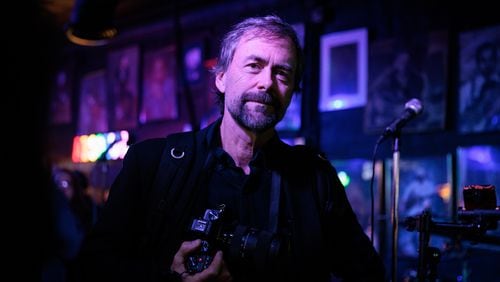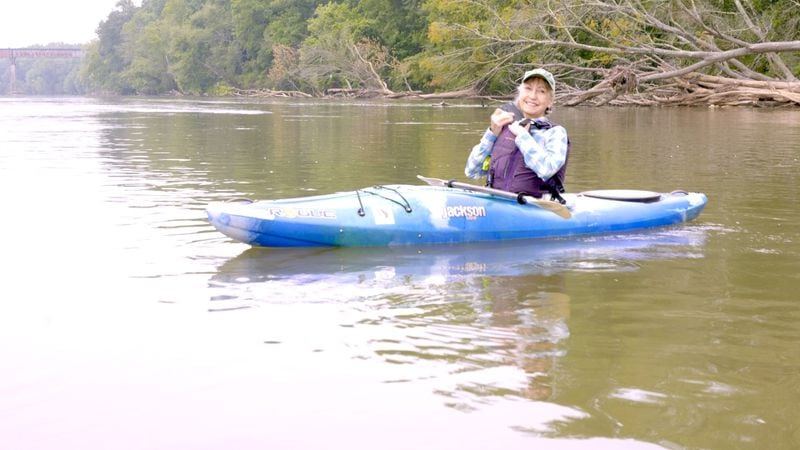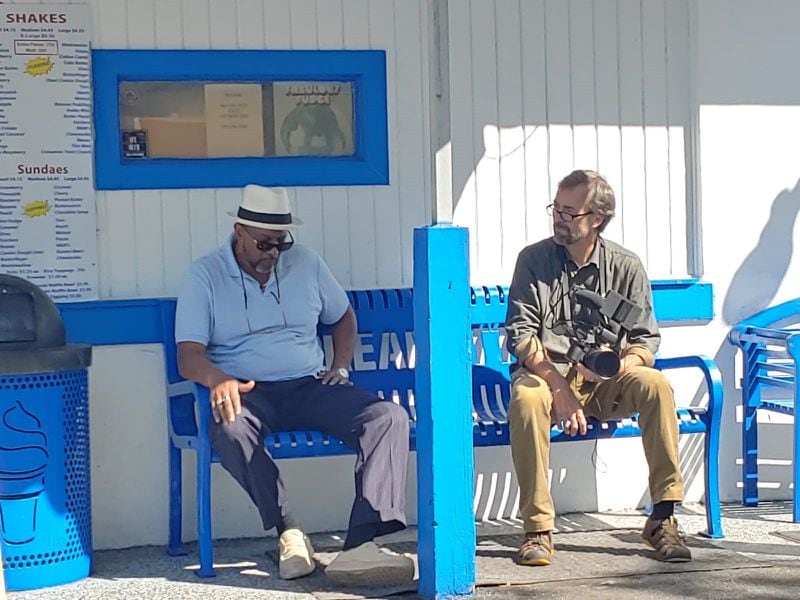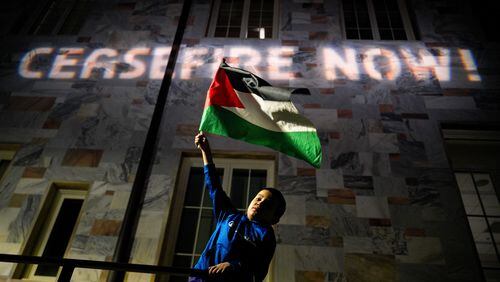Hollywood once came calling on Atlanta filmmaker Hal Jacobs.
Disney bought his script about a Maasai tribe, and Whoopi Goldberg expressed some interest. It seemed like a big break. The creative process, though, proved fraught with frustrations.
“All we had to do was take notes from the producer until he was happy,” Jacobs recalls. “I know what I don’t like. For months we revised and revised until he liked what we no longer liked. End of story. I decided I wasn’t cut out for Hollywood. The whole thing was so unpleasant that I don’t even want to talk about it.”
Nevertheless, he still had things to say. So Jacobs took a grassroots, DIY approach to filmmaking. Nowadays, using a small, handheld Panasonic camera, he works on his own terms with a skeleton crew of five on a shoestring, crowd-funded budget.
“What makes our productions different is that we don’t rely on foundation or corporate grants and thus aren’t beholden to their oversight or decorum, which is often a recipe for dullness, predictability and hagiography,” he says. “We get to make movies that we want to watch. The technology is now so affordable and user-friendly that anybody can make a movie.”
He shrugs.
Maybe so, but not just anybody can make the movies Jacobs does. In the firmament of Georgia’s klieg-lit entertainment industry, Jacobs has become the go-to auteur for indie documentaries, lo-fi, thoughtful boutique affairs that keep it local while exploring big ideas. With inspiration from Errol Morris and a “studio” in his Decatur living room, Jacobs has produced a handful of feature length and short films exploring social justice, the arts and environmentalism with deftness. Many of them can be streamed at www.hjacobscreative.com.
Credit: Hal Jacobs
Credit: Hal Jacobs
‘Good stories in Georgia’
Jacobs’ most ambitious film to date is “Saving the Chattahoochee: The Story of the Atlanta Women Who Defended the River Over Five Decades” (2024), about efforts to clean up the beloved aquatic artery. The 40-minute documentary, which premiered to a sold-out crowd at the Tara Theatre, looks at Sally Bethea, one of the first women riverkeepers in the country. She teamed up with Shirley Franklin, Atlanta’s first Black female mayor, who — despite opposition from the usual suspects in the political and business establishments — invested $4 billion to upgrade the water system.
“When he first approached me,” Bethea recalls, “I didn’t want to do it because I thought this story has already been told, and who wants to see mostly old women on screen? But I looked at his other work and saw how Hal so skillfully weaves these threads together and connects them in a bigger story that somehow makes the story new. I realized this story had to get told, in the way only Hal can tell it.”
If you think a movie about water quality sounds dull, guess again. The film, made with $20,000, features Bethea and Franklin talking at a kitchen table — two veteran warhorses, candidly reminiscing — and also relies on nostalgic footage that will trigger memories of every Atlantan of a certain vintage who ever frolicked in the fabled raft races. It is a success story sure to inspire community pride, which was one of Jacobs’ goals.
“Saving the Chattahoochee” airs on Georgia Public Broadcasting on Earth Day, April 22.
“Hal is a deep thinker with a passion for good storytelling,” says Dave Kirkpatrick, a producer of “Jimmy Carter: Rock and Roll President.” “People open up to him right away and trust him with their stories because he’s so easy to talk to, and he’s very thorough.”
With every project, Jacobs does a deep dive, interviewing dozens of subjects — as many as 75 — and dipping into archival footage for “edutainment” that is polished, briskly edited and chock-full of facts.
“I was bored with celebrity documentaries and murder stories, and stories always emanating from the East or West coasts,” Jacobs says. “So I started looking for good stories in Georgia and the South. People look for locally sourced food and beer, so why not docs as well?”
Sylvia Cross, who owns Sycamore Place Gallery in Decatur, often screens Jacobs’ work for the community. “Hal takes these almost forgotten issues and explores them to their depths, but does it in a way that instills both light and hope. He’s sort of like a Jane Goodall with his camera, acting as an anthropologist to show us our own behavior, but in a way that empowers the individual to make a difference.”
Credit: Tim Gilmore
Credit: Tim Gilmore
‘Racist, redneck family’
Jacobs, 66, is willowy and softspoken, with a resting face of wry bemusement. Generally, he listens more than he talks. “He’s a quiet man — seemingly,” says Bethea. “But spend a few minutes with him and you realize there’s a lot going on there.”
Jacobs was adopted from birth into a working-class, devoutly Catholic family in Jacksonville, Florida. In some ways, it was an idyllic childhood, with a library and two movie theaters just a bike ride away. “I would watch the Don Knotts movies, and ‘Night of the Living Dead,’ and the Billy Jack movies, which scared the bejesus out of me,” he says.
His father was a trucker. “Remember those coffee tables that had pictures in them? My family’s had Jimmy Hoffa, George Wallace, and the pope — the holy trinity,” he says, arching an eyebrow. “It was what might be called a racist, redneck family.”
Determined to become a writer, he studied at Florida State University, where he co-founded a sketch comedy group, Asylum Theater, modeled after “Saturday Night Live.” “That had a lasting influence on me,” he says. In this troupe he met Joe Boris, a photographer who has collaborated on all of Jacobs’ films. It was Boris who eventually lured Jacobs to Atlanta.
“Hal left our comedy group to stumble out of every bar across Europe, as most aspiring writers assumed was de rigueur in the mid-’70s,” Boris says. “There’s no pretension with him. He is what he seems. He’s so humble he doesn’t like to talk about himself.”
Jacobs married Alicia Macbeth, who became a librarian and an executive producer for his film projects. They have two sons and three grandchildren. In Atlanta, he worked in academic publishing for Emory and Georgia State University and penned humor pieces for local publications on the side. Then the film bug bit.
Credit: Joe Boris
Credit: Joe Boris
Celebrating heroines
He started with a short on Mary Crovatt Hambidge called “Whistler, Wanderer, Weaver and Utopian” (2017) — the tagline was “One of the most remarkable Southern women you’ve never heard of.” She founded the Hambidge Center artists’ colony in Clayton.
Then Jacobs tackled civil rights author Lillian Smith with “Lillian Smith: Breaking the Silence” (2019) before moving to the present day with Sarah Higinbotham, a professor who developed an education initiative known as Common Good Atlanta. His film “Breaking Down the Walls of Incarceration: Common Good Atlanta” (2022) explores, movingly, the salutary effects of education on people who are incarcerated.
If there is a through-line to Jacobs’ work it is his exaltation of fierce, formidable female changemakers and conservators. He found a heroine in the “Northside Tavern: The Mostly True Account of the Golden Age of Atlanta’s Most Exquisite Blues Dive” (2022).
“Proprietor Ellyn Webb could have sold that bar to developers for millions of dollars and didn’t because it was the center of a family of blues musicians and blues lovers,” he says of the squat building that still sits surrounded by gleaming condos — a stubborn, scabby holdout against gentrification.
His most personal film is “Just Another Bombing?” that explores a white supremacist’s dynamite attack on the home of a Black boy who had integrated a Jacksonville school. It comes with a trigger warning for Florida teachers that it might cause “discomfort” and a disclaimer that it happened in Jacobs’ community — yet he knew nothing of it until 50 years later.
“I think of myself as a sort of ‘reformed redneck,’ trying to make amends, Jacobs says, referencing his roots. “This is what I want to do with my old age, telling stories of overlooked but important people. I don’t need a lake house.”
Or Hollywood.
FILM PREVIEW
“Saving the Chattahoochee.” Screening and discussion presented by GPB. 6 p.m. April 16. Free. Columbus Public Library, 3000 Macon Road, Columbus. www.gpb.org. Also airs April 22, Earth Day, on GPB.
Stream “Lillian Smith,” “Common Good” “Mary Hambidge” and “Murrell Catawampus” for free and “Northside Tavern” for $4.99 at www.hjacobscreative.com
About the Author



/cloudfront-us-east-1.images.arcpublishing.com/ajc/2YMW7HCPHZDNHESDNJ7SAXC37Q.jpeg)





